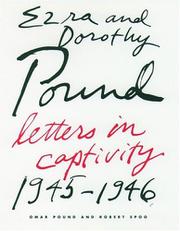

EZRA AND DOROTHY POUND
Letters in Captivity, 1945-46
by Omar Pound & Robert Spoo
Was the great poet a traitorous madman or an quixotic visionary? These previously unpublished letters and documents give more evidence for his sanity than for any lack of it. Beginning in 1940, Pound voluntarily broadcast pro-fascist speeches from Italy, aimed at listeners in the US. Americans, he declaimed, had betrayed their own tradition. Not Roosevelt but Mussolini was the inheritor of the American revolutionary legacy: “The heritage of Jefferson...is HERE, NOW in the peninsula at the beginning of the fascist second decennio, not in Massachusetts or Delaware.” Pound expounded crackpot economic views (anti-Semitic conspiracy theories) while dispensing Confucian wisdom. In May 1945, American authorities arrested and indicted the 60-year-old poet for treason. He was found insane and committed to a federal mental institution. The documentation here seems contradictory. Reports of Pound’s behavior at the time suggest that he was sporadically delusional. For example, when arrested, Pound insisted that he was the right man to negotiate peace with Japan on behalf of the US: “Subject became very indignant,” observed his FBI interrogator to J. Edgar Hoover, when the FBI refused to cable his offer to Truman. However, in letters to his wife, Dorothy, Pound comes across here as mundanely sane, even vigorously, impishly self- possessed. He offers her “nooz items” and asks for hers, in return; reports on gifts received (—Eileen have came again with masses of chocolate & a copy of Verlaine—); provides congratulations (—Glad you are payin income tax, indicates existence of income—;and conducts literary conversation in his signature wry lingo (in a cover note to a military censor about poems forwarded to Dorothy, he declared, “The Cantos contain nothing in the nature of a cypher or intended obscurity—). Spoo (English/Univ. of Tulsa) and Omar Pound, the poet’s son, offer copious and needed annotations to the highly allusive, typically playful letters. As ever, Pound remains a spitfire conundrum.